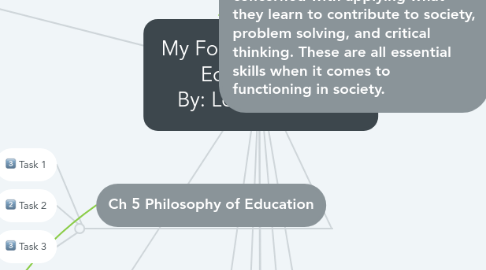My Foundations of Education By: Lori Waring
by Lori Waring

1. Ch 5 Philosophy of Education
1.1. Task 1
1.2. Task 2
1.3. Task 3
2. Students who come from lower socioeconomic backgrounds often seem to perform less in school. Many argue that this situation that students come to school from stem from an unfair and unequal opportunity already at their disadvantage. I agree that socioeconomic backgrounds play a role in school, but it is not the only correlation with students' performance. Other explanations for the achievement gap can have to do with students' strengths and weaknesses, with a weakness that may be academics for a variety a reasons. Some my perform well in school with ease, and other may struggle due to different ways they process information. All students have different abilities. I think we should be more focused on playing a role in students' progress. There are is more than one explanation for the achievement gap that I agree, puts some students at a disadvantage more than others.
3. The four purposes of education consist of intellectual, economic, social and political purposes. The intellectual purpose of school is to teach students skills in writing, reading, and mathematics and them to develop a higher way of thinking. The social purpose of school has to do with settling social problems. This has to do with social cohesion and teaching students to work as a one, like a family or church, This element of socialization is a key skill in society. The economic purpose of school is to prepare students for their future jobs in how they will support themselves in the future. The political purpose of school is to teach students to stand loyal to existing political order, and to teach them existing regulations in society.
4. Ch 3 History of U.S. Education
4.1. Buy Christmas presents
5. Ch 4 Sociological Perspectives
5.1. Task 1
5.2. Task 2
5.3. Task 3
6. Try MeisterTask!
7. Ch 2 Politics of Education
8. Ch 3: I believe that the Education for Women and African-Americans had the biggest impact on education. Women were once seen to only take on the role of taking care of family and house. They were not known to work and provide. African Americans were forbidden education education. The beginning of educating women, I believe, majorly changed education. Women, just like men, shall have the right to education.
9. Ch 3: One interpretation of education is The Process of Education Reform: Conflict and Accommodation: This interpretation first revolved around the idea that the economy, known as capitalism, is always changing. Education is a means of reproduction in this ever-changing economy while education sets a standard of cultural values and remains the same. Second, there is a mismatch as far as the future economy and education systems. In summary, options for higher education is changing the economy.
10. Ch 4: Theoretical perspective and education sometimes overlap. The different perspectives are concerned with applying what they learn to contribute to society, problem solving, and critical thinking. These are all essential skills when it comes to functioning in society.
11. Ch 4: Teachers are to be role models for students and they, in fact, are a model for students with how to act in society. They are also encouraged to push their students and praise them for doing well. These two effects impact the behaviors of students in society. Education also enables students to become functional in society, and produces rise in the economic situation in society.
12. Ch 5: The generic notions theory states that the social conflict and struggle is what makes history. This has to do with social order and change. The goal of education state that the goal is to reproduce the economic, social, and political society. ideology plays a part in this reproduction system. Teachers are supposed to present material in a way that makes them think about the world and enhances critical thinking. Having students connect to the world through educational experiences is the primary goal.
13. Ch 7: I am choosing to advocate for develompentalism. This is about the needs and interests of students rather that society. This student centered philosophy has to do with teaching content related to students' needs and interests in their present developmental stage. This makes it possible to relate the curriculum to students' experiences and make education come alive.
14. Ch 7: One important tradition of teaching is the focus on how something is taught, which is just as important as what is taught. How something is taught makes to difference of students comprehending content or not. The relationship between curriculum, the content, and how it is taught is what makes teaching effective. Another tradition is the effectiveness of what is being taught. What is taught in schools isn't always equivalent to what is learned in schools. Social and economic class has an effect on how much a student learns at school, along with the curriculum taught. There are also arguments that levels of education correlates both with test scores and ones' educational knowledge. This shows that schools have a influence on cognitive development. These arguments conclude that school does have an effect on students.
15. Ch 7
16. Ch 6
17. Ch 6: The federal level of power plays a significant role in today's education system. They set laws on what the general education system be. The local level has a larger say so in the curriculum taught. The state officials determine curriculum that is taught in schools. Superintendents determine how schools with run within their system. Local officials have more say so in what happens in schools than the federals.
18. Ch 6: Political energy is daily expended to keep schools in a state of equilibrium. School cultures are ever changing and this is prevented through authority. Schools are often at tension with each other which is aggravated through this authority.


